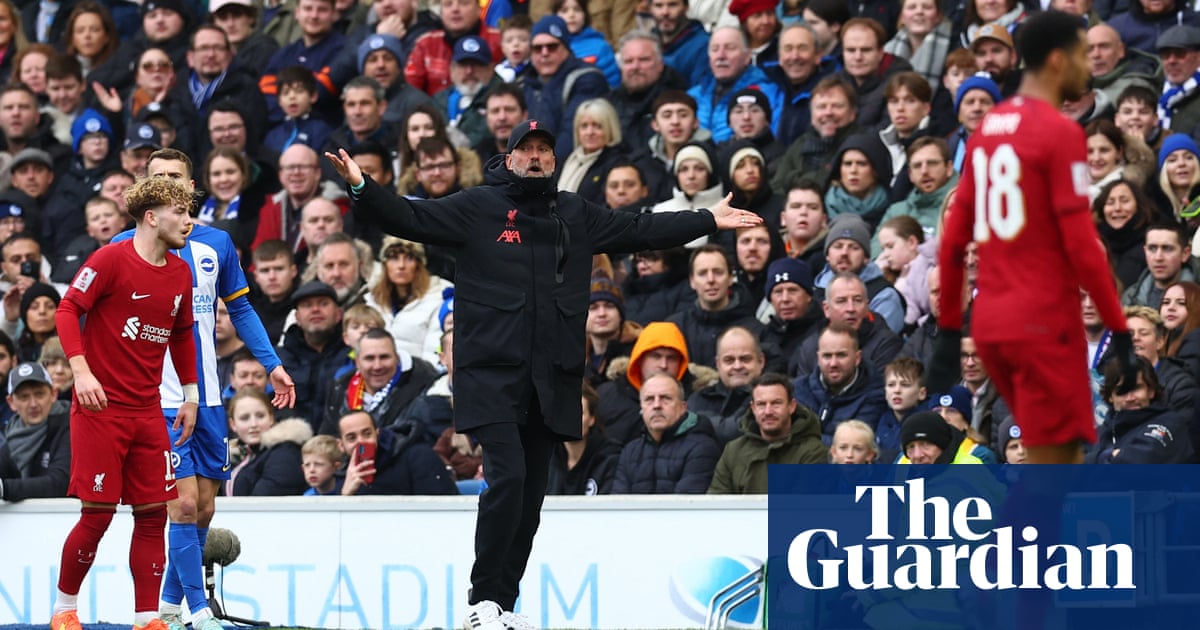
At the end of England’s semi-final victory against Denmark Gareth Southgate appeared on the Wembley pitch and walked across to commune with the England fans. A bit frazzled, but still dapper and trim and looking, as ever, like a kindly infantry officer who secretly writes poetry, Southgate went to the western end of Wembley, the end from which the boos before kick-off had emerged earlier in the tournament, but which responded now in a great barrelling surge of noise as Southgate waved and gurned in response.
Watching Southgate commune with Deep Flag England, it was hard to equate this bellicose former professional footballer from Crawley, Gareth who once had a massive stand-up row with his best mate because he wouldn’t take off his cap in a restaurant, with the idea, floated around the place in the last few days, that England and Southgate might not accept an invite to meet the prime minister at No 10 Downing Street should they win Euro 2020. Gareth is a voice for tolerance. Gareth is a tool of “deep woke”. Gareth also loves the flag and reveres the military. And whatever you say he is, that is, most likely, what he’s not.
Such has been the fevered political traffic around Southgate, there is a danger of losing sight, just a little, of his most vital qualities.
As England go about the final systems checks for Sunday’s Euro 2020 final, it is tempting to wonder what will be left of Southgate, what strange, distended shape his public profile will take on should England actually go on and win it.
Three years ago, as the team rolled unexpectedly through Russia 2018, the wider world made Southgate into a kind of pop‑culture cartoon. There were Gareth “takes”, purring appreciations of his soulful-deputy-headteacher good looks, and already some claims on his politics, his status as an eloquent mouthpiece for good sense. But mainly Southgate 2018 was a kind of Peter Blake cutout: waistcoated, beaky, punching the air.
Cut to the present day and it is startling how politicised the Southgate persona has become. Southgate never speaks about politics. He has mentioned Brexit once, an unfavourable reference to some of the noises around the process of leaving. He is vocally anti-racist in the things he says and does, which might count as politics if these are things you oppose.
At a time when everything, everywhere is violently polarised it was inevitable Southgate and his team would be hoist as a totem of the left, to the extent in the wilds of social media every England victory, even goals scored and team sheets dropped, are greeted with a spume of tweets about the government, Brexit, even, for some reason, bundled in with stuff about masks and vaccines.
Plus, of course, Southgate has become a target and general straw man of the right, accused in odd parts of the internet of “wokery” and traitorous multiculturalisms. The toxic, divisive and ludicrous Rod Liddle called him toxic, divisive and ludicrous (also “thick”). This week the Boris Johnson-backing Daily Telegraph published a Southgate article condemning Gary Neville’s Boris Johnson-bashing Southgate TV rant, a nuclear-scale meltdown of ideas and oppositions that should probably just be interred beneath 4,000 tonnes of concrete and left to degrade for the next 500 years.
Theorising about the over-theorising of Southgate is, of course, a rabbit hole of its own. But there is a frustration in all this, and above all a loss of clarity. Southgate’s success, and his best qualities, do have something to tell us. To politicise this so narrowly is also to misunderstand it, to miss what this England team and this England manager are trying to tell us. We are almost there now. Southgate and England are on the verge of becoming something indelible, a piece of the popular culture in perpetuity. It is important to get him right.
Southgate’s success as England football manager is above all about clarity and individual responsibility, about things that feel like the opposite of tribal politics. Southgate is interested in truth, detail, kindness and rigour. These are the qualities that have brought success with the England football team – in part because there was so much slack to take up here.
His character, outlook and willingness to challenge existing structures reflect to some extent his own time in football, his own very English kind of outsider-dom. Southgate was “Nord” in his early days at Crystal Palace, so called because he spoke “posh” (he was a working-class lad) and had eight O-levels (two As, four Bs, two Cs).
He was a skinny, nerdy, straggler at first. “You have to fucking toughen up. As a travel agent or an estate agent you’d be perfect. As a footballer, no fucking chance,” Alan Smith famously told him during one near-fatal bollocking. Southgate made a record number of reserve appearances at Palace. He almost drifted off.
He went on to play 57 times for England. But he suffered occasionally, hated the game, saw sloppiness and laziness all around him. With England he never really recovered from the weirdness of finding out he would play in midfield to mark Mehmet Scholl in what would be Kevin Keegan’s final game, without training or preparation, then seeing this leaked to the press, discussed dismissively on television before it had even happened – only to find out as Germany kicked off that Scholl had been moved to another position anyway.
If Southgate has a cause it is a war on this kind of laziness, the lack of care, the philistinism and entitlement that have always been a barrier to progress with England. Famously, the first time Walter Winterbottom produced a chalkboard in an England team meeting there was a near-riot at such schoolmasterly practices. For so long the basic notion of simply “being England” of having English players, English stars (“the Norwegians are in awe of him”) was deemed enough.
This is what Southgate’s humility, his attention to detail, the hours of work with Steve Holland analysing opponents, data, and player performance stand against. If Southgate has a disdain also for prejudice, closed doors, inequity, this seems to spring from the same human impulse – the idea of rigour, meritocracy, an open door to talent, new things, people who have had to push too hard for the same treatment in the past.
If those attributes of honesty and clearsightedness have positioned him on the left politically, as some kind of inverse Boris Johnson, this is perhaps because the current prime minister embodies so vigorously the opposite qualities. But for Southgate it isn’t about politics. This is incidental deep wokery, second nature progressiveness. And while the rest of the world may be eager to hitch itself to these qualities, and with a campaigning vengeance should England win on Sunday, it is worth remembering that the best of Gareth comes – really, hands off – from Gareth himself, and from football.












